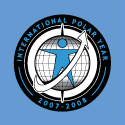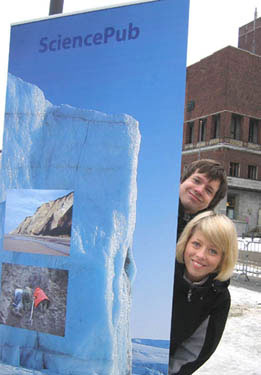


Students join SciencePub
TRONDHEIM: The first students have now joined the group that is communicating the research done by SciencePub to the public. Kristiane Bræck Larsen (23) and Erik Fosheim Brandsborg (24) from Oslo University College will write their bachelor’s degree theses on the project.
By Gudmund Løvø

THE POLAR YEAR: Both Kristiane Bræck Larsen and Erik Fosheim Brandsborg attended the opening of the International Polar Year in front of the City Hall in Oslo on 1 March this year. Photo: Gudmund Løvø
Kristiane Larsen and Erik Brandsborg are both second-year students taking the media and communication course in the Department of Journalism, Librarianship and Information at Oslo University College. They look forward to starting.
Geological fieldwork
”We’re going to take part in fieldwork for two weeks near Ny-Ålesund in Svalbard in July. In the autumn, we’ll spend a week visiting one of the institutions involved in the project, and in spring 2008 we’ll write our bachelor’s degree theses on a topic linked with the presentation of the project,” the two students tell me.
They have already received their first introduction to the International Polar Year and SciencePub. Professor Jon Landvik from the Norwegian University of Life Sciences at Ås recently held a lecture for a group of media students at Oslo University College. Jon Landvik will also be in charge of the summer’s geological fieldwork in the Kongsfjord area in Svalbard.
Knowledge about climate
”Why did you want to take part in SciencePub?”
”Because I think the changing climate is the greatest and most urgent challenge facing humanity today,” Erik Brandsborg replies.
”We need to know more to tackle the challenge in the right manner, and this knowledge must also be presented in a good way. Projects like SciencePub play a major part here, and the Arctic is a key area to acquire insight into the climate changes and what they mean for human and animal life. It’s important to be able to think differently and creatively when you’re communicating research, and to use untraditional media channels and methods,” Erik Brandsborg thinks.
Global warming
For her part, Kristiane Larsen tells me that this is an exciting project which interests her very much and from which she thinks she can learn a great deal.
“It’s important to pass on information on research, and this is a field where many improvements can be made. More people should be trained in science journalism and in communicating information, and cooperation with scientists could be improved,” she says.
She mentions, for example, the two summaries published recently by the UN Intergovernmental Panel on Climate Change, which place even greater focus on global warming and its consequences.
Blogging in the media
Andreas Ytterstad, a lecturer at Oslo University College, is also joining the information communication group in SciencePub along with the two students. He will initially write a paper on the climate debate and blogging to present at the Nordic Media Conference in Helsinki on 16 – 19 August 2007.
”This will most likely mark the start of more research concerning citizen journalism,” Ytterstad says.

KNOWLEDGE: ”We need knowledge to be able to decide what to do about the climate problem,” says Kristiane Larsen, before she gets to grips on the task of communicating the research being carried out by SciencePub. Photo: Erik Fosheim Brandsborg
THE EARTH: ”The climate problem is the most urgent issue of our age. It concerns the entire Earth,” Erik Brandsborg, seen here at the opening of the International Polar Year, says. Photo: Kristiane Bræck Larsen